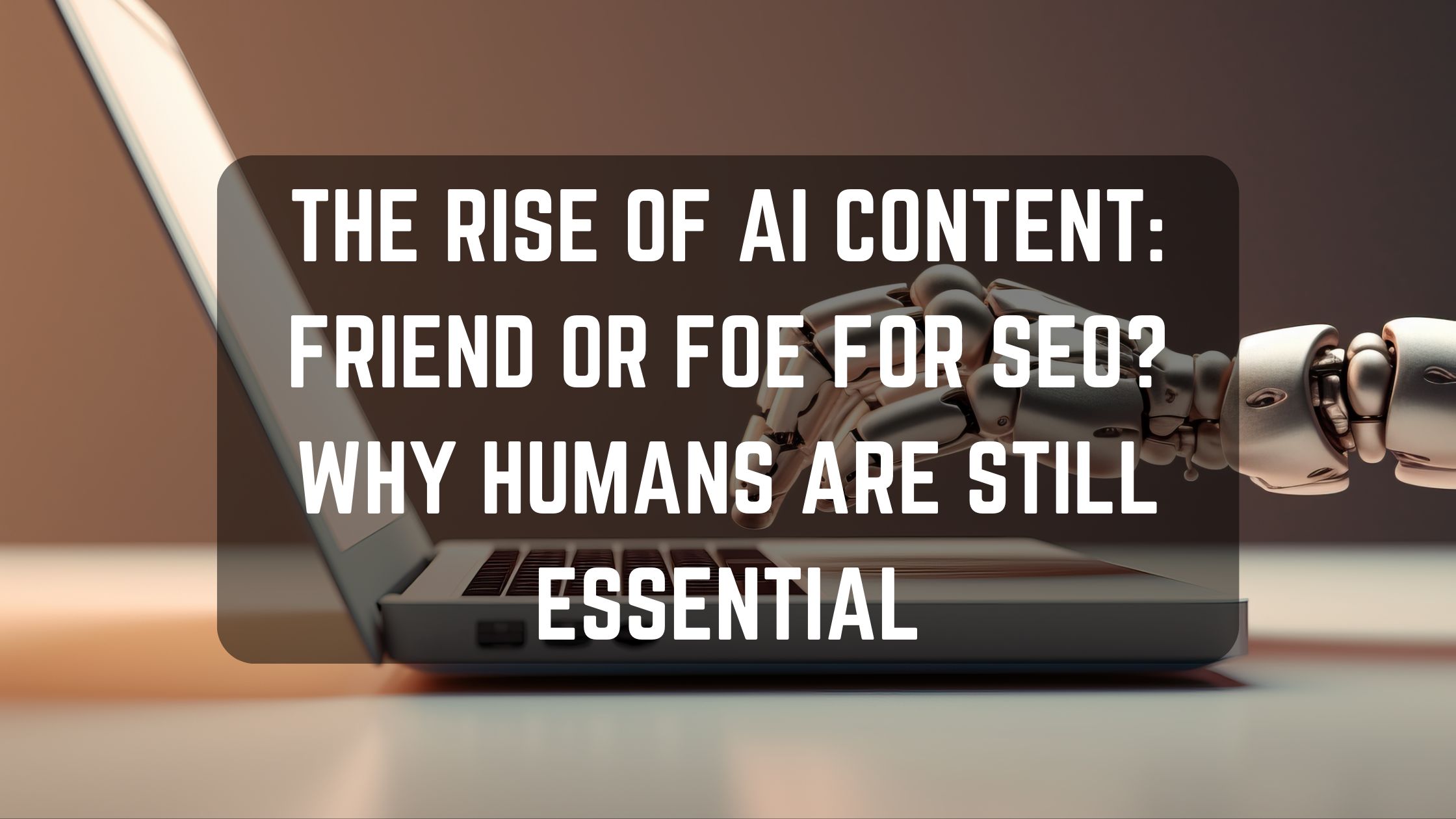FOLLOW US ON:
Have you ever read an article online that felt strangely generic, like it could have been written about any topic? This is a growing trend with the rise of AI-generated content.
What is AI-generated Content?
AI-generated content is text, audio, or video created by artificial intelligence algorithms. These algorithms are trained on massive amounts of data and can learn to mimic human writing styles. AI content can be produced quickly and efficiently, making it attractive for businesses and websites that need to create a lot of content.
The Rise of AI Content:
In recent years, AI-generated content has become increasingly prevalent. This is due to several factors, including:
- Advancements in AI technology: AI algorithms, particularly Natural Language Processing (NLP), are becoming more sophisticated and capable of producing human-quality text.
- The demand for content: With the growth of the internet, there is a constant demand for fresh and engaging content. AI can help to meet this demand by automating some of the content creation process.
- The need for efficiency: Businesses are always looking for ways to save time and money. Automated content can be a cost-effective way to create a large volume of content.
While AI offers clear benefits, there are also challenges to consider when using AI-generated content, which we’ll explore next.
The Driving Forces Behind AI Content
The increasing prevalence of AI-generated content can be attributed to several key factors that make it an attractive solution for content creation:
- Advancements in AI Technology, Particularly Natural Language Processing (NLP): At the heart of AI content generation lies NLP, a branch of AI that enables computers to understand and process human language. Recent advancements in NLP have allowed AI algorithms to analyze massive amounts of text data, including websites, articles, and books. By identifying patterns and statistical relationships within this data, AI can learn to generate human-like text, mimicking writing styles and sentence structures.
- The Growing Demand for Personalized and Targeted Content: Today’s audiences expect content that caters to their specific interests and needs. AI can be a valuable tool in personalizing Information by analyzing user data and search behavior. This allows businesses to tailor content to different audience segments, increasing engagement and conversion rates.
- The Need for Faster and More Efficient Content Creation: In today’s fast-paced digital world, the ability to create content quickly and efficiently is crucial. AI can significantly accelerate the content creation process. Whether it’s generating blog post outlines, suggesting relevant keywords, or summarizing complex topics, AI tools can free up valuable time for content creators to focus on strategy and higher-level tasks.

The Impact of AI Content: A Double-Edged Sword
The rise of AI-generated Data presents a double-edged sword for creators and SEO strategies. Here’s a breakdown of the potential benefits and challenges:
A. Benefits
- Increased Content Output and Efficiency: AI can automate repetitive tasks in the content creation process, allowing creators to focus on more strategic aspects like brainstorming ideas, developing content calendars, and refining brand voice. This boost in efficiency can lead to a significant increase in content output, keeping websites fresh and engaging for visitors.
- Potential for Improved Content Quality (with Caution): AI can analyze vast amounts of data to identify patterns and trends in successful content. This data-driven approach can help content creators craft pieces that resonate with target audiences and address their specific needs. However, it’s important to remember that AI cannot replace human expertise in critical thinking and creative storytelling.
- Ability to Personalize Content for Specific Audiences: By analyzing user data and search behavior, AI can personalize content to different audience segments. This allows creators to tailor content to specific interests and pain points, leading to greater engagement and potentially higher conversion rates.
B. Challenges
- The Risk of Generic and Uninspired Content: AI-generated content can sometimes lack the human touch and creativity that resonates with readers. Over-reliance on AI could lead to a proliferation of generic and forgettable content that fails to capture attention or establish a brand voice.
- Potential for Duplicate Content and Copyright Issues: If not carefully monitored, AI-generated content can lead to accidental plagiarism or duplicate content issues. This can negatively impact SEO rankings and damage a website’s credibility.
- Maintaining a Human Touch and Emotional Connection: Building trust and rapport with readers is crucial in content marketing. However, AI-generated content can struggle to convey emotions, humor, or a genuine human voice. This can make it difficult to connect with readers on a deeper level and build lasting relationships.
The Role of AI in SEO: Friend or Foe?
AI can be a powerful tool in your SEO arsenal, but it’s important to understand how to leverage it effectively. Here’s how AI can be used for SEO tasks, and why human expertise remains a crucial partner:
How AI Can Assist SEO
- Keyword Research and Topic Suggestion: AI can analyze search trends and identify relevant keywords and topics that your target audience is searching for. This helps you create content that is both informative and optimized for search engines.
- Content Outline Generation and Optimization: AI tools can help generate initial content outlines based on chosen topics and keywords. They can also suggest improvements for existing content, ensuring proper keyword density and content structure for search engine algorithms.
- Identifying Trending Topics and Content Clusters: AI can analyze vast amounts of online data to identify emerging trends and content clusters that are gaining traction. This allows you to stay ahead of the curve and create content that is relevant and timely for your audience.
The Importance of Human Expertise Alongside AI
While AI offers valuable assistance, human expertise remains irreplaceable in SEO for several reasons:
- Content Strategy and Editorial Direction: AI can’t replace the human ability to develop a comprehensive content strategy that aligns with your overall business goals and brand message. Humans are needed to make editorial decisions, determine content pillars, and ensure consistency of voice and tone throughout your content.
- Maintaining Brand Voice and Ensuring Alignment with Brand Message: AI may struggle to capture the unique voice and personality of your brand. Human editors are crucial for ensuring that AI-generated content aligns with your brand message and resonates with your target audience.
- Fact-Checking, Editing, and Revising AI-Generated Content: It’s essential to have human editors fact-check, revise, and polish AI-generated content for accuracy, clarity, and flow. AI can’t replace the critical thinking and judgment needed to ensure the content is factually correct, grammatically sound, and engaging for readers.
By combining the power of AI with human expertise, you can create a winning SEO strategy that leverages the efficiency of AI while maintaining the quality, creativity, and brand consistency essential for long-term success.
E-E-A-T: The Trust Factor in SEO and AI Content
When it comes to SEO and ranking well in search results, Google prioritizes content that demonstrates E-E-A-T, which stands for Experience, Expertise, Authoritativeness, and Trustworthiness. This concept is particularly important for content related to Your Money or Your Life (YMYL) topics that can impact a person’s well-being, such as health advice or financial planning.
The Challenge of E-E-A-T and AI Content
AI-generated content, on its own, can struggle to establish E-E-A-T. Here’s why:
- Lack of Real-World Experience: AI algorithms don’t possess the real-world experience and knowledge that human experts bring to the table. This can make AI-generated content seem impersonal and lacking the depth of understanding that users expect from trustworthy sources.
- Unestablished Reputation: New AI tools may not have a proven track record of publishing high-quality content. This can make it difficult for search engines to assess the trustworthiness of AI-generated content compared to content from established experts.
Bridging the Gap: Leveraging AI for E-E-A-T Content
Fortunately, you can leverage AI to create content that adheres to E-E-A-T principles by following these steps:
- Train AI on High-Quality, Reliable Sources: Ensure the AI tool you use is trained on data from credible sources authored by established experts. This helps the AI learn from reputable voices and styles.
- Human Oversight: Editing and Fact-Checking: Don’t rely solely on AI output. Utilize human editors with relevant expertise to curate, edit, and fact-check AI-generated content. This ensures accuracy, and adherence to brand voice, and injects the human touch for better audience connection.
- Clear Author Attribution: Clearly attribute authorship to a qualified human writer or editor. This establishes trust and demonstrates that a real person with expertise is responsible for the content.
By combining AI’s efficiency with human oversight and expertise, you can create content that is both informative and trustworthy, ultimately strengthening your SEO strategy.
The Future of AI-Generated Content: A Look Ahead
The future of AI-generated content is brimming with possibilities but also necessitates careful consideration. Here’s a glimpse into what we can expect:
- Evolving AI Capabilities: Advancements in Natural Language Processing (NLP) and machine learning can lead to AI that generates even more sophisticated and human-like content. This could blur the lines between human-written and AI-generated content, making it even more crucial to prioritize human oversight and editorial control.
- Impact on Content Creators and Industries: AI automation might change the landscape for certain content creation tasks. While some repetitive tasks may be fully automated, the need for human creativity, strategic thinking, and editorial expertise is unlikely to disappear. AI could become a valuable assistant, freeing up content creators to focus on higher-level strategy and creative storytelling.
- Ethical Considerations and Responsible Use: As AI content generation becomes more prevalent, ethical considerations become paramount. It’s crucial to use AI responsibly to avoid issues like:
- Bias: AI algorithms can perpetuate existing biases in the data they’re trained on. Careful selection of training data and human oversight are essential to mitigate bias in AI-generated content.
- Misinformation: The potential for AI to be used to generate misleading or false content requires vigilance. Fact-checking and human review processes are crucial to ensure content accuracy.
- Plagiarism: AI tools should be used to create original content, not simply rephrase existing content. Proper attribution of sources and avoiding copyright infringement are essential.
By acknowledging these challenges and using AI responsibly, we can harness its potential to create a future where AI and human creativity work together to produce informative, engaging, and trustworthy content.
Striking a Balance for SEO Success
The rise of AI-generated content presents a fascinating opportunity to streamline content creation and potentially improve content quality through data analysis. However, for SEO success and building trust with your audience, it’s essential to prioritize human expertise alongside AI.
Key Takeaways:
- AI offers significant benefits for SEO, including increased content output, keyword research assistance, and content optimization.
- However, automated content can lack the human touch, creativity, and E-E-A-T (Experience, Expertise, Authoritativeness, and Trustworthiness) that Google prioritizes, particularly for YMYL (Your Money or Your Life) topics.
The Winning Formula: Human-AI Collaboration
By striking a balance between AI efficiency and human expertise, you can create a powerful SEO strategy:
- Leverage AI for tasks like keyword research, content outlining, and trend identification.
- Utilize human editors with relevant experience to curate, edit, and fact-check AI-generated content.
- Ensure clear author attribution to establish trust and showcase the human element behind the content.
The Future of Content Creation
As AI capabilities evolve, the future of content creation will likely involve a collaborative approach between AI and human creators. AI can handle repetitive tasks, freeing up human creators to focus on:
- Developing a comprehensive content strategy aligned with business goals.
- Maintaining brand voice and ensuring content resonates with the target audience.
- Injecting creativity, storytelling, and emotional connection into content.
The Road Ahead: Responsible AI Use
The future of AI-generated content is promising, but ethical considerations are crucial. We must use AI responsibly to avoid bias, misinformation, and plagiarism. By prioritizing human oversight, fact-checking, and responsible data usage, we can ensure AI is a force for good in content creation.
In conclusion, AI-generated content presents a valuable tool for SEO, but it’s just one piece of the puzzle. By embracing the power of AI while prioritizing human expertise and responsible use, you can create a winning SEO strategy that delivers informative, trustworthy, and engaging content for your audience.







